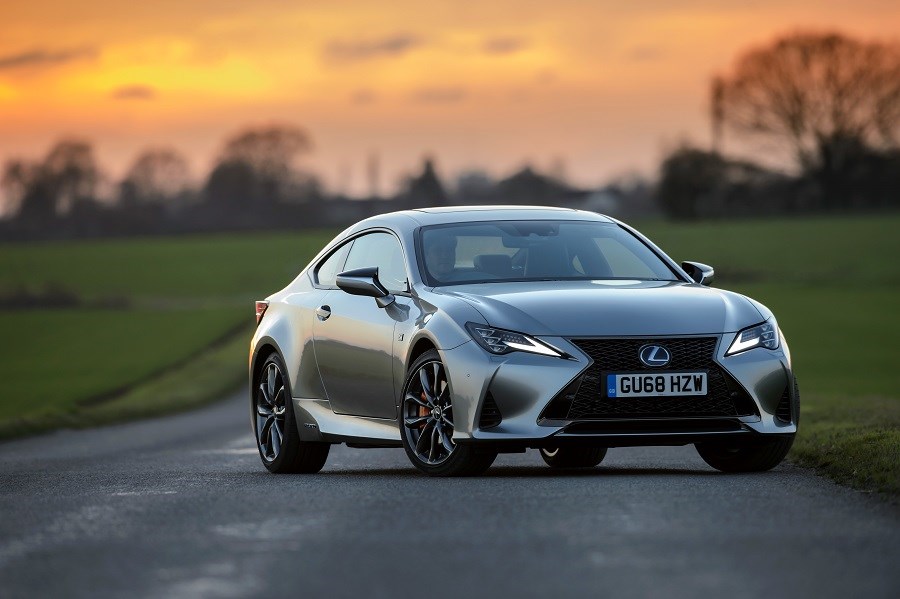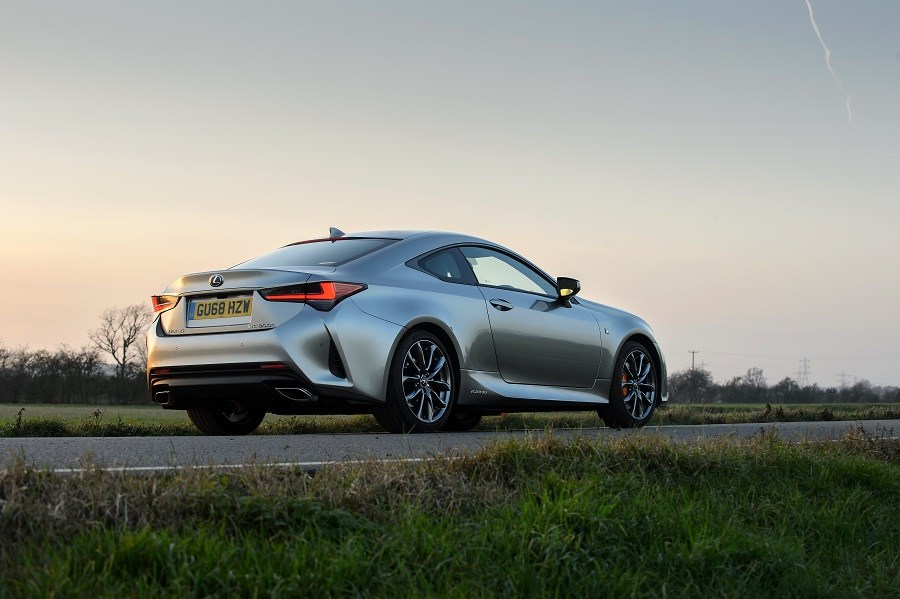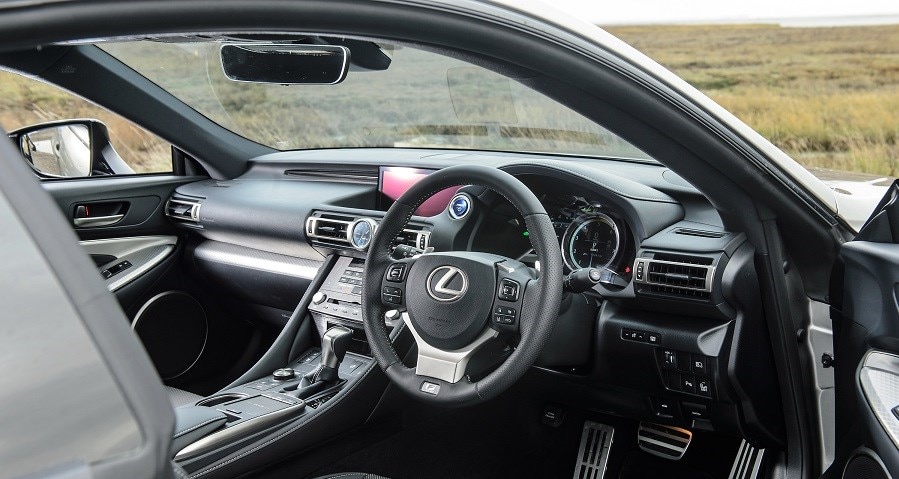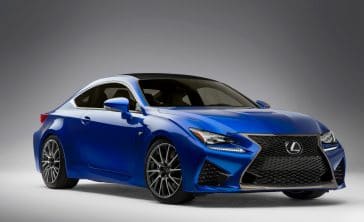Model Review
With Lexus taking a break from making premium coupes, in 2013 it re-entered the sector with a stylish-looking new model — the RC.
Unveiled at the 2013 Tokyo Motor Show, the RC benefited from the typical Lexus styling traits—an angular front end and imposing front grille, for example—but combined with the rakish looks of a two-door coupe.
The RC was unveiled with either a 3.5-litre V6 petrol engine or a hybrid powertrain, although the UK only got the hybrid model before a powerful V8 ‘F’ version joined the range.
The RC is built on the same platform as the GS saloon, which is a similar size to a BMW 5 Series. Lexus also promised better driving dynamics than ever with the new coupe.
Lexus said its aim with the model was to increase awareness of the brand, and appeal to a wider audience. It was nearly two years after its original unveiling in November 2013 that UK customers took first deliveries of the RC.
Latest model
In 2018, Lexus added its Safety System+ package as standard to all RCs, as well as satellite navigation and a 10.3-inch screen also being offered for no extra cost. A new ‘Premier’ pack was added to the F-Sport grade, which offered luxuries such as a Mark Levinson sound system. A new vibrant Naples Yellow is also now available.
In an unusual move, just a few months after this update, the firm revealed another updated RC. Taking inspiration from the range-topping LC coupe, the new RC benefitted from a new front bumper, a revised grille along with air ducts being integrated into the corners of the model’s front bumper.
Small adjustments were also made to the interior to improve quality, with new materials — such as brushed aluminium — being added to the cabin, as well as a new analogue clock lifted from the more expensive LC. Sales of the revised RC kicked off in November 2018.
Value for money
The range starts from £38,800 and rises to just under £50,000, so Lexus’s smallest coupe is by no means cheap, even when you consider the lengthy list of equipment fitted as standard.
Where the RC makes more sense, though, is on the used market. The premium coupe sector is dominated by rivals from Germany — namely the Audi A5, BMW 4 Series and Mercedes C-Class Coupe — which all hold their value excellently. Lexus doesn’t quite have the same brand appeal as its competitors, and the RC’s prices haven’t held up as well as a result, with used models starting from around £23,000. Nearly-new versions are also an intriguing prospect too, with a one-year-old example typically costing from £32,000, which is a notable saving off list price.
Looks and image
The Lexus is arguably more stylish in terms of design than its German rivals, although some might not be a fan of imposing details such as the huge ‘spindle’ front grille. We personally think it looks great, and adds a level of class to the Lexus, while a rakish design, sharp-looking front and rear lights and large alloy wheels all give the RC fantastic road presence. The latest model’s bid to look like a baby version of Lexus’s range-topping LC coupe has also paid off.
The interior is also as you expect from a modern Lexus — stylish and well-built. The RC300h is headed up by a large 10.3-inch screen which hosts a range of connected services and satellite navigation, while plush materials are used throughout. It’s a shame that leather upholstery isn’t included as standard, although the Tahara seats feel nearly as premium. Our only real gripe is with the touchpad, which is used to operate the main screen. It’s far too fiddly to use and is some distance off being as intuitive as the systems fitted to Audis and BMWs.
The main disappointment with the RC300h, however, is the way it drives. We would forgive Lexus if it marketed the coupe as being comfortable, rather than ‘dynamic’, but it doesn’t, which is why the model is a bit underwhelming. Its 220bhp powertrain might sound plenty, but it equates to not particularly spirited performance thanks to the RC300h’s high kerbweight. The CVT gearbox is also a poor match for the RC, as it dulls performance further and feels unrefined under heavy acceleration. On the plus side, it’s a comfortable cruiser and delivers a supple ride, which results in stress-free long journeys.
Space and practicality
While it can’t be expected for a stylish two-door coupe to be practical, the RC300h still trails behind rivals when it comes to spaciousness.
The awkward-to-access rear seats is a forgivable foible given that it’s much the same as other two-door rivals, but the space once you’re back there is disappointing. Adults will struggle to get comfortable in the back with limited legroom and headroom, which warrants the RC300h a two-seater, with the added bonus of rear storage space. Its boot is more spacious, and offers a decent 366 litres, which will prove to be plenty for weekend jaunts away and shopping trips, although it falls short of rivals.
While the RC300h doesn’t sell in big enough numbers to warrant it being crash tested by Euro NCAP, it should prove to be a safe car. We advise looking out for models built from 2018 onwards, as these are fitted with the excellent Lexus Safety System+ package, which includes adaptive cruise control, automatic emergency braking, traffic sign recognition, lane-keep assist and high-beam assist. It’s certainly an impressive suite of features, which gives the RC300h a key advantage over its rivals.
Engines
In the past, Lexus briefly offered its RC with the option of a 2.0-litre petrol engine, although slow sales of the model resulted in its demise. This seemed fitting, given that Lexus is a frontrunner in terms of hybrid technology.
The RC300h utilises a 2.5-litre petrol engine, paired to an electric motor and lithium-ion batteries, which unlike plug-in models, is charged by the engine on the go. In total it produces 220bhp, which sounds plenty, although the excess weight from the electrification somewhat mellows performance. Power is delivered to the rear wheels by a CVT automatic transmission, with no option for a manual gearbox. The RC300h subsequently manages a 0-60mph time of 8.4 seconds, and a top speed of 118mph — falling short of similarly-powerful rivals.
Running costs
You might expect the RC300h to be a particularly efficient car to run, given its hybrid power. However, the result is something not much more frugal than a similarly-powered petrol coupe from rivals, while a diesel coupe will still be far kinder on the pocket. Lexus claims a combined fuel economy figure of 45.5mpg, although it does offer low CO2 emissions of 114g/km, which will help the RC to be an appealing proposition to business users, given its lower Benefit-in-Kind company car tax bracket.
It’s also worth being aware that all trims above the entry-level car will incur an extra £310 in annual road tax for the first five years after first registration. Insurance groups range from 31 to 35, which means the RC300h won’t be cheap to insure, although it’s comparable with rivals.
Things to look out for
Lexus has an excellent reputation for its cars’ reliability, along with highly-rated dealers, which should provide plenty of confidence when purchasing an RC. With the model being sold in such small numbers, it’s hard to gauge the car’s reliability. Given the firm’s past record though, there should be little to worry about.
Rivals
The RC300h’s primary rivals all come from Germany, with the Audi A5, BMW 4 Series and Mercedes C-Class Coupe being the biggest players in this sector. You could also look at the Audi TT, Infiniti Q60 and a used Jaguar F-Type, too, for a similar price.
Depreciation
Limited demand and high list prices have meant that the RC300h has depreciated quite heavily, which can make it a credible used purchase next to more desirable rivals from Audi, BMW and Mercedes, which will be more expensive on the used market.





